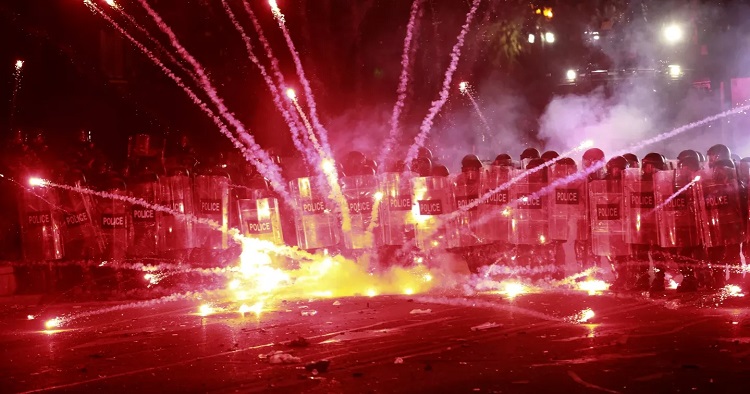More than 40 individuals were hospitalized in Georgia amid protests triggered by the suspension of EU negotiations


A third night of protests in the Georgian capital against the government’s decision to suspend negotiations to join the European Union left 44 people hospitalized after police deployed water cannons and tear gas, officials said Sunday.
Tens of thousands of demonstrators gathered outside the parliament Saturday night, throwing stones and setting off fireworks. An effigy of the founder of the governing Georgian Dream party, Bidzina Ivanishvili — a shadowy billionaire who made his fortune in Russia — was burned in front of the legislature.
Georgia’s Interior Ministry said Sunday that 27 protesters, 16 police and one media worker were hospitalized.
Prime Minister Irakli Kobakhidze warned that “any violation of the law will be met with the full rigor of the law.”
"Neither will those politicians who hide in their offices and sacrifice members of their violent groups to severe punishment escape responsibility,” he said at a briefing Sunday.
He said it wasn't true that Georgia’s European integration had been halted. "The only thing we have rejected is the shameful and offensive blackmail, which was, in fact, a significant obstacle to our country’s European integration.”
On Saturday, he said that unspecified “foreign entities” wished to see the “Ukrainization” of Georgia with a “Maidan-style scenario” — a reference to Ukraine’s 2014 Maidan revolution that ousted Ukraine’s Moscow-friendly president and unleashed a decade of momentous change for Ukraine, eventually leading to its current war with Russia.
Kobakhidze also dismissed the U.S. State Department’s statement Saturday that it was suspending its strategic partnership with Georgia. The statement condemned Georgia’s decision to halt its efforts toward EU accession.
“You can see that the outgoing administration is trying to leave the new administration with as difficult a legacy as possible. They are doing this regarding Ukraine, and now also concerning Georgia,” Kobakhidze said of the U.S. “This will not have any fundamental significance. We will wait for the new administration and discuss everything with them.”
The ruling Georgian Dream party’s disputed victory in the Oct. 26 parliamentary election, which was widely seen as a referendum on Georgia’s aspirations to join the EU, has sparked major demonstrations and led to an opposition boycott of parliament.
The opposition has said that the vote was rigged with the help of Russia, Georgia’s former imperial master, with Moscow hoping to keep Tbilisi in its orbit.
Speaking to The Associated Press on Saturday, Georgia's pro-Western President Salome Zourabichvili said that her country was becoming a “quasi-Russian” state and that Georgian Dream controlled the major institutions.
“We are not demanding a revolution. We are asking for new elections, but in conditions that will ensure that the will of the people will not be misrepresented or stolen again,” Zourabichvili said. “Georgia has been always resisting Russian influence and will not accept having its vote stolen and its destiny stolen.”
The government’s announcement that it was suspending negotiations to join the EU came hours after the European Parliament adopted a resolution criticizing last month’s vote as neither free nor fair. It said the election represented another manifestation of Georgia’s continued democratic backsliding “for which the ruling Georgian Dream party is fully responsible.”
The EU granted Georgia candidate status in December 2023 on condition that it meet the bloc’s recommendations, but put its accession on hold and cut financial support earlier this year after the passage of a “foreign influence” law widely seen as a blow to democratic freedoms.
EU lawmakers urged a rerun of the parliamentary vote within a year under thorough international supervision and by an independent election administration. They also called on the EU to impose sanctions and limit formal contacts with the Georgian government.
The Georgian prime minister denounced what he described as a “cascade of insults” from EU politicians and said that “the ill-wishers of our country have turned the European Parliament into a blunt weapon of blackmail against Georgia, which is a great disgrace for the European Union.”
Kobakhidze also said Georgia would reject any budgetary grants from the EU until the end of 2028.
Critics have accused Georgian Dream of becoming increasingly authoritarian and tilted toward Moscow. The party recently pushed through laws similar to those used by the Kremlin to crack down on freedom of speech and LGBTQ+ rights.
